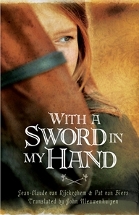With a sword in my hand by Jean-Claude van Rijckeghem and Pat van Beirs

Translated by John Nieuwenhuizen. Allen and Unwin, 2010. ISBN 9781741758658.
Middle school. Historical. Highly recommended. Marguerite pours out her
hatred for her father, the man who sent away her mother, who was
brought to
near madness and despair after a series of shocking births, stillborn
children and the early death of her only son, leading her to drink
poison. The presence of his only living child, Marguerite, daily mocks
his absolute despair for a son, a boy to inherit his castle, a boy to
carry his name, the next Count of Flanders. But when he hisses at her,
throwing a chair at her while leaving the room, she goes to the one
place where all women go who hate the men in their lives, the little
chapel on the marshlands, containing the disheveled statue of Mary,
known locally as 'Our Lady of Hate'. It is fourteenth century Flanders,
and the count is in constant battle with his daughter, Marguerite.
What an amazing tale. Marguerite is a marvellous character, full of
fire
and life, denying her father's dismissal of her, undermining his
authority by riding her horse like a man, learning to fence and finding
a kissing partner. He often taunts that he will marry her off, and when
he announces that he has chosen as his son in law, the son of the English
king, Edmond, Marguerite is shocked to her very core. Here is the son
of the king who murdered her grandfather, who is part of the English
monarchy fighting France through the Hundred Years' War, but supplying
Flanders with the fine English wool which keeps the people of Bruges
spinning their fine cloth. The political tension is well realised, as
the Count must weigh up the influence of the French court which
includes his mother, and the English court which supports his
country's economic base.
This exceptionally well written book, redolent of medieval times, moves
along effortlessly, with no hint of it being a translation. Each
sentence is a joy to read, each page memorable in its detail and flow,
each chapter urging to be reread. Several pages at the end give an
account of the real Marguerite, adding to the story read in the novel.
The religious basis, the everyday life in court as well as the
kitchens, bath houses, training places and the castle, all add a finely
detailed background to this novel which tells of one person's life, a
life restricted by circumstance, birth and religion. Although the
freedoms Marguerite enjoys are more consistent with a girl from the
twentieth century, the story, background and the characters carry the
novel along, completely immersing any reader.
Fran Knight